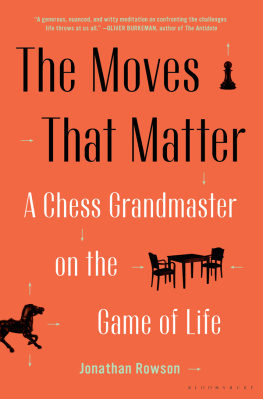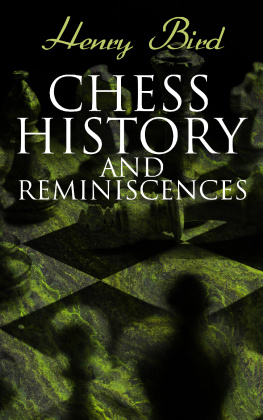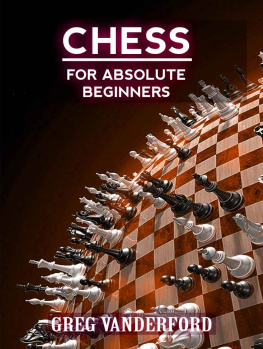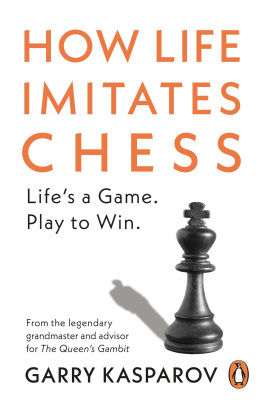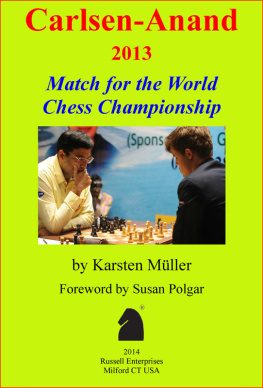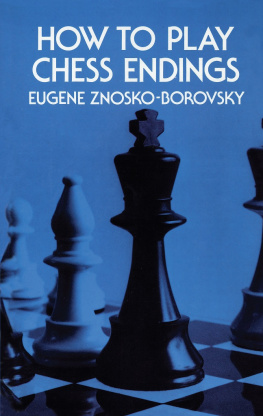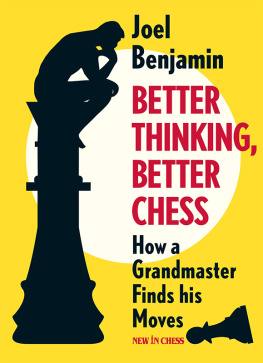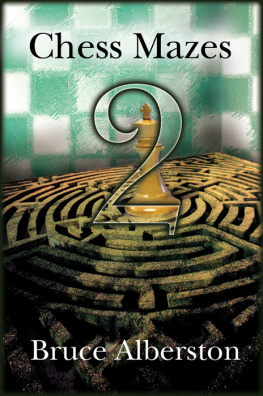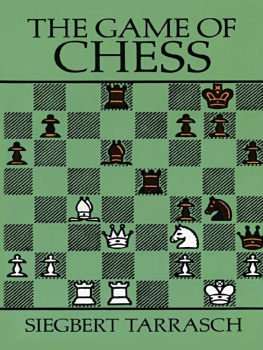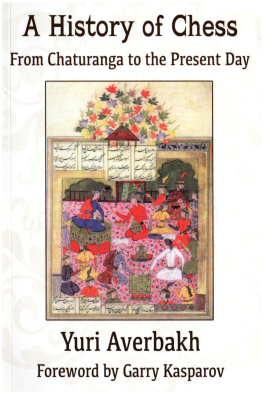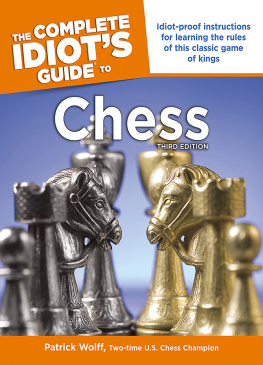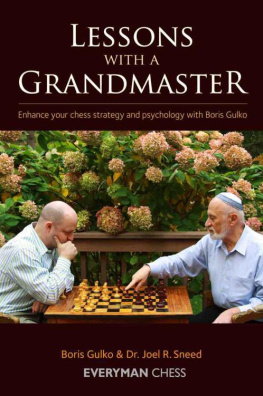
THE MOVES
THAT MATTER
BLOOMSBURY PUBLISHING
Bloomsbury Publishing Inc.
1385 Broadway, New York, NY 10018, USA
BLOOMSBURY, BLOOMSBURY PUBLISHING, and the Diana logo are trademarks of Bloomsbury Publishing Plc
First published in 2019 in Great Britain
First published in the United States 2019
Copyright Jonathan Rowson, 2019
Jonathan Rowson has asserted his right under the Copyright, Designs and Patents Act, 1988, to be identified as Author of this work
For legal purposes the constitute an extension of this copyright page
All rights reserved. No part of this publication may be reproduced or transmitted in any form or by any means, electronic or mechanical, including photocopying, recording, or any information storage or retrieval system, without prior permission in writing from the publishers.
Bloomsbury Publishing Plc does not have any control over, or responsibility for, any third-party websites referred to or in this book. All internet addresses given in this book were correct at the time of going to press. The author and publisher regret any inconvenience caused if addresses have changed or sites have ceased to exist, but can accept no responsibility for any such changes.
ISBN: HB: 978-1-63557-332-9; eBook: 978-1-63557-333-6
Library of Congress Cataloging-in-Publication Data is available.
To find out more about our authors and books visit www.bloomsbury.com and sign up for our newsletters.
Bloomsbury books may be purchased for business or promotional use.
For information on bulk purchases please contact Macmillan Corporate and Premium Sales Department at .
OTHER BOOKS BY JONATHAN ROWSON:
Understanding the Grnfeld
The Seven Deadly Chess Sins
Chess for Zebras
Spiritualise
To Kailash and Vishnu
It is a very plain and elementary truth that the life, the fortune, and the happiness of every one of us depends upon our knowing something of the rules of a game infinitely more difficult and complicated than chess. It is a game which has been played for untold ages, every man and woman of us being one of the two players in a game of his or her own. The chessboard is the world, the pieces are the phenomena of the universe, the rules of the game are what we call the laws of Nature. The player on the other side is hidden from us.
Thomas Henry Huxley, A Liberal Education , 1876
Contents
A wayward young man sought guidance in a temple on the outskirts of his city. He was weary, tired of pretending that he knew what life was for.
The resident master looked him over. What have you studied? he asked.
The only thing that ever really captivated me was chess.
The master fetched his nearby assistant and reminded him of his vows of trust and obedience. He instructed him to fetch a chess set and a sharp sword.
He returned to the young man. You will now play a game of chess with my assistant, and I will behead whoever loses. If chess is really the only thing you feel is worth mentioning, and you cant beat someone who barely knows the rules, your life is not worth saving.
On sitting down to play, the young man noticed he was beginning to tremble; the prospect of death bringing him to life for the first time in months. Suddenly something mattered. After a few familiar moves he rediscovered the bliss of concentration, the beauty of ideas, and his superior understanding became obvious.
On realising that he would soon deliver checkmate, he looked up at his opponent. The masters assistant was so unlike him. On the chessboard he was floundering, but he looked disciplined, dignified and full of the goodness of life.
The significance of the next few moves would live on and the young man was no longer sure what he wanted from the game. He maintained his advantage, but started to make small mistakes to keep the game going. The master noticed the change in perspective and swept the pieces from the board.
No one needs to die here today! he said. Only two things matter on lifes path: complete concentration and complete compassion. You have learned them both today.
But the master did not fully convince. The players knew the game might have ended differently. The young man stayed a while in the temple and the opponents became lifelong friends. It is not known whether they ever played chess again.
Chess is just a game in the way that the heart is just a muscle. There is a muscle that pumps blood around the body, but it is the heart that sustains life, signifies love and situates courage. There is a game with sixty-four squares, thirty-two pieces and some rules, but it is chess that has become a metaphor for human battles big and small, an enchanting mirror for the psyche, and an icon for all that is deep and difficult.
Chess is not the meaning of life, but it does simulate conditions for a life of meaning. Whether through work or love or art, life becomes more meaningful whenever we take responsibility for something or someone. Responsibility is not always pleasurable or even positive, but it is purposeful it adds significance and direction to life and helps answer the perennial human question: what should I do? And while our lives are characterised by many things, they are defined most profoundly by the open secret of our inevitable deaths. Chess simulates the meaning of life because it is a ritual encounter with death in disguise, where we experience the responsibility to stay alive one move at a time.
The game is sublimated warfare and chess players are compelled to kill, but unlike the gruesome horror of war, the martial conceit of chess allows us to experience aesthetic liberation. Every battle is a unique geometric story where two protagonists seek to destroy each other, but the underlying logic feels beautiful and true. The more intense the battle and the more sublime the ideas, the more we experience power and freedom.
No wonder chess has long served as the touchstone of choice for the competitive tension that defines business, sport and politics. The themes of planning ahead, knowing the opponent, anticipating responses and sacrificing for future gains are adaptable, and meaningful for anybody familiar with the symbolism of chess, even if they have never pushed a pawn.
However, the connection between chess and life is usually assumed to be almost exclusively about the application of strategic thinking. Too little has been written about how chess evokes and illustrates emotional and existential issues. There is more to be said, for instance, about the anguish of defeat, the craving for status, the joy of reaching beyond our grasp, and the sublime beauty of an unexpected winning idea.
This book is a philosophical offering on chess as a metaphor for life as a whole. The question that drives my inquiry is, simply: what has chess taught me about life? I attempt to answer that question through sixty-four vignettes over eight chapters. The narrative proceeds from psyche to community to world; encompassing cognition, competition, education, culture, technology, politics, aesthetics and beyond.
The psychotherapist Carl Rogers said that what is most personal is most universal, and I seek to be personal in that sense. The ideas that follow have been fashioned from the experience of dedicating myself to chess as a confused child, building a resilient teenage identity through the game, becoming a Grandmaster at twenty-two, travelling around the world as a professional player, teacher and writer for much of my twenties and early thirties, becoming British champion three times and regularly competing with world-class players, and then doing something that most Grandmasters never do: enduring a maturational process of detaching from the game and building a professional and family life outside it.
Next page
